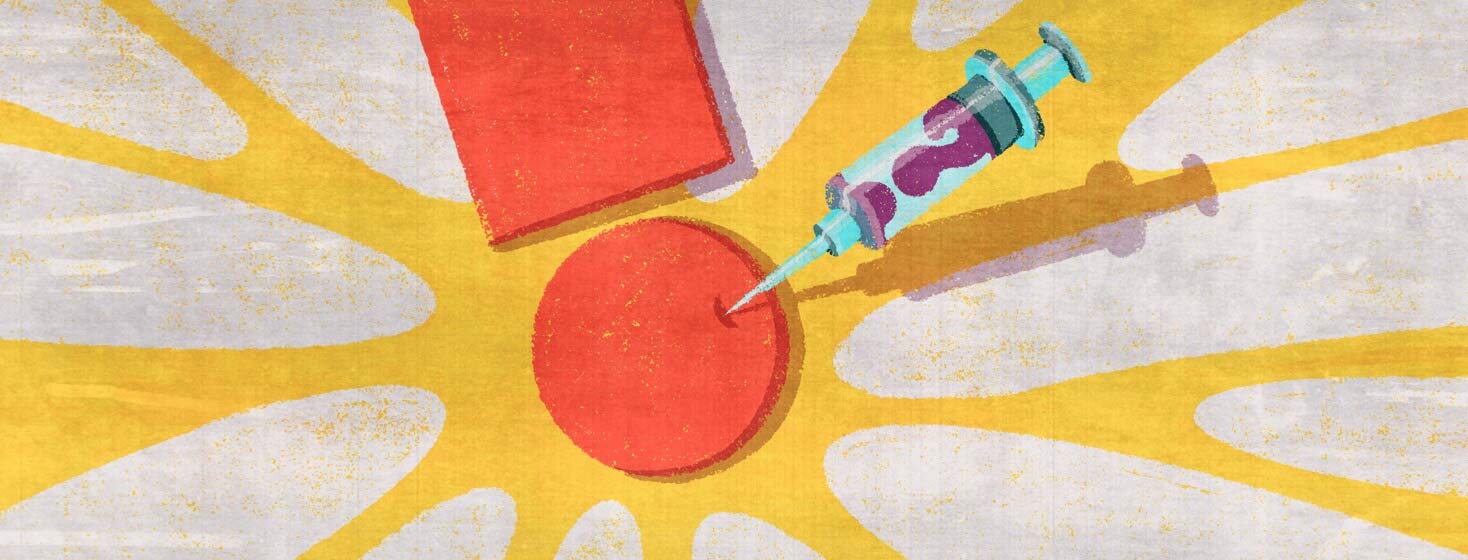How a New Cancer Drug May Help Treat HIV
You may have seen headlines recently about a cancer drug that may help cure HIV. This drug is called pembrolizumab (brand name Keytruda®). Let’s look at what we know so far.1
How this drug works
Keytruda is approved to treat a few different types of cancers that have spread through the body, like cancer of the kidney, colon, or lung. It’s a type of monoclonal antibody treatment, like you may have heard about for treating COVID. Antibodies are proteins our bodies use to fight infection and cancer. Monoclonal antibodies are lab-made antibodies designed to target a specific problem, like the COVID virus.
In the case of Keytruda, the antibodies target a protein called PD-1, which is found on T cells, a part of our immune system. PD-1 inactivates T cells, like a switch that turns them off. If T cells are turned off, they don’t work well, and infections and cancers can spread. By blocking PD-1, Keytruda turns those T cells back on, so they will do their job of handling the infection or cancer.2,3
The problem with a hidden virus
One of the challenges to curing HIV is that the virus can live in inactive CD4 T cells. This is called "latency." Our immune system doesn’t recognize these latent or hidden infections, so it doesn’t do the work to get rid of them. Antiretroviral therapy (ART) doesn’t work against this hidden virus either. ART is great at stopping an active virus, but it leaves behind a "reservoir" of hidden virus that can cause problems later. In order to truly cure an HIV infection, that reservoir needs to go.3-5
"Shock and kill"
Researchers have a plan for how to deal with the hidden virus: what they call the "shock and kill" theory. The idea is to re-activate the T cells where HIV is hiding (the "shock" part), and then give ART drugs that can get to the hidden virus and kill it. Scientists hope that Keytruda could be a drug that will provide the shock needed to uncover the hidden virus.4
Does it work to treat HIV?
Researchers studied people living with HIV who were taking Keytruda as a cancer treatment. They wanted to see if Keytruda would decrease the amount of hidden virus, making it available for ART to attack. All people in the study were taking ART and had a suppressed viral load before treatment. They were mostly men, and about 60 percent were white. They had a variety of types of cancer: 10 had HIV-related cancers like Kaposi’s sarcoma, and 22 had unrelated cancers.3
The researchers found signs that the T cells were more active after treatment. This means the drug was re-activating T cells, as the researchers hoped. This happened after just one dose of Keytruda. Viral load stayed low in all but one of the people in the study. So there’s hope that Keytruda can help bring the hidden virus out into the bloodstream where antiviral drugs can treat it.
Side effects
Keytruda, like many kinds of cancer treatment, can cause difficult side effects. The first clinical trial looked at how safe Keytruda is for people living with HIV. In 30 people taking Keytruda to treat cancer, 29 had some type of side effect. Most were mild and treatable, like anemia, tiredness, and nausea. Twenty percent had more severe side effects, like low white blood cell counts.6
Some effects were treatable but permanent: 27 percent developed hypothyroidism and will need to take medicine for that. Viral load remained undetectable in 23 people and low (<400 copies/ml) in the other. Treatment stopped or slowed down cancer for most people in the study (20 out of 30). But one person died of the virus that causes Kaposi’s sarcoma.7
Where do we go from here?
This is very early information, and there are still many questions.
Does Keytruda really get rid of the virus reservoir or just a small part of it? Will a lower dose do the job without all the side effects? What drugs are best to combine with Keytruda to provide the "kill" part of the equation? Which people are likely to have an increase in viral load with this medicine, and how does that impact their health? Will it work better in people who don’t have cancer? More clinical trials are planned to try to answer some of these questions.8
These Keytruda trials give us some new information about the "shock" step in the "shock and kill" process: how to make the hidden virus vulnerable to treatment. This may take us a step closer to a cure for HIV, but there’s much more to learn.

Join the conversation